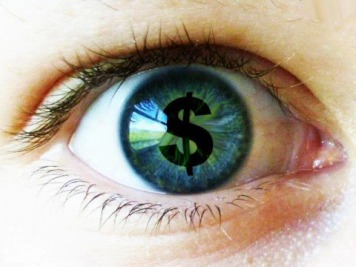Frankenstein
Meet the Author:
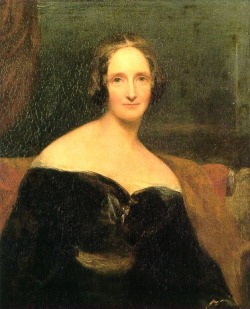
Born August 30, 1797, in London, England, Mary Shelley was the daughter of William Godwin, a political theorist, novelist, and publisher who introduced her to eminent intellectuals and encouraged her youthful efforts as a writer. Shelley’s mother was Mary Wollstonecraft, a writer and early feminist thinker, unfortunately she died of puerperal fever 10 days after shelly’s birth. Mary Shelly became educated through her father’s intellectual circle, and in 1812 Mary met Percy Shelley, when she was fifteen. At the time, she was married, but the two spent the summer of 1814 traveling together. In February, 1815, they both had a premature baby girl which died twelve days later. In her journal, Mary recorded the following dream, which could have been a possible inspiration for Frankenstein: "Dream that my little baby came to life again - that it had only been cold & that we rubbed it before the fire & it lived." A son, William, was born to the couple in January, 1816.
In the summer of 1816, both Mary and Percy visited Lord Byron at his villa beside Lake Geneva in Switzerland. During these times, the weather was often rough and stormy which forced the guests inside and they would spend their time reading volumes of ghost stories. Lord Byron had proposed a challenge to his guests to write their own ghost stories. This event spawned Frankenstein. Two years later, after the novel was complete, December 30, 1816 Mary and Percy Shelley were married.
The book was published in 1818 and became a huge success. The Shelley’s had left England to go off to Italy in 1819. In 1819, her three year old son William had died and Mary had suffered a nervous breakdown. Of all the children Mary had, only Percy Florence who was born in 1819 lived past childhood. Mary suffered more tragedy in 1822 when her husband Percy Shelley drowned and died. Only being twenty-five years old and a widow, she vowed not to marry and traveled back to England with her son where she devoted herself to her son's welfare and education, and continued her career as a professional writer. Mary Shelley lived in England until her death from a brain tumor in Bournemouth, England, on February 1, 1851. She was 54 years old.
In the summer of 1816, both Mary and Percy visited Lord Byron at his villa beside Lake Geneva in Switzerland. During these times, the weather was often rough and stormy which forced the guests inside and they would spend their time reading volumes of ghost stories. Lord Byron had proposed a challenge to his guests to write their own ghost stories. This event spawned Frankenstein. Two years later, after the novel was complete, December 30, 1816 Mary and Percy Shelley were married.
The book was published in 1818 and became a huge success. The Shelley’s had left England to go off to Italy in 1819. In 1819, her three year old son William had died and Mary had suffered a nervous breakdown. Of all the children Mary had, only Percy Florence who was born in 1819 lived past childhood. Mary suffered more tragedy in 1822 when her husband Percy Shelley drowned and died. Only being twenty-five years old and a widow, she vowed not to marry and traveled back to England with her son where she devoted herself to her son's welfare and education, and continued her career as a professional writer. Mary Shelley lived in England until her death from a brain tumor in Bournemouth, England, on February 1, 1851. She was 54 years old.
Mary Shelley: The Drive
Mary Shelley was brought up in the 19th century. During these times the society that she lived in believed in Enlightenment ideas. The Enlightenment was a philosophical movement in the eighteenth century Europe that fostered the belief that one could reform society by discovering rational laws that governed social behavior and that were just as scientific as the laws of physics. However, Mary Shelley herself were against these beliefs. She demonstrates this throughout the work. She shows this through Victor’s search for the unknown eventually leads to his downfall but also this could be taken as a warning into industrial expansion because at this era of time, industry began to boom. Mary Shelley also refers to Paradise Lost by Milton, referring to the monster as the devil, demon from hell. Not only did society have an influence on her writing, but it is also suspected that her motivation for the novel was from her life experiences. In her life she gave birth to four children, and three of which died during infanthood. Shelley also blames herself for the death of her mother; many critics believed that her tragic life may have played a major role in her motivation for Frankenstein.
Book Summary:
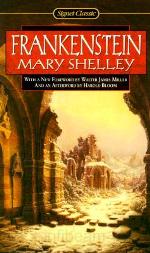
The novel begins with a narration from Robert Walton through a series of letters to his sister. Walton sets out to explore the North Pole in hopes of achieving fame and friendship. The ship becomes trapped in ice and the crew encounters Victor Frankenstein, worn down by fatigue and in need of help. Robert becomes curious about what the stranger is doing in such an isolated place. He replies that he is seeking that which has run away from him. Robert immediately remarks that he saw an abnormally large human the other day. The tale of Victor Frankenstein begins when he retells his story.
Victor begins by narrating his story from his childhood. Victor was born in Geneva and comes from a wealthy family. His father was married to Caroline, his friend Beaufort's daughter. They live a happy life and spend time in Italy, Germany and France. Victor, their oldest child, accompanies them everywhere. Caroline longs to have a daughter, and they come across a beautiful girl from a poor family. Caroline later visits the family again and decides to adopt the girl. The girl grows up in a foster family until she is adopted by Victor and Caroline. Victor's family is complete when he receives a playmate in Elizabeth, whom he loves, protects and cherishes until death. Victor's parents now expect him to study at Ingolstadt.
Victor begins by narrating his story from his childhood. Victor was born in Geneva and comes from a wealthy family. His father was married to Caroline, his friend Beaufort's daughter. They live a happy life and spend time in Italy, Germany and France. Victor, their oldest child, accompanies them everywhere. Caroline longs to have a daughter, and they come across a beautiful girl from a poor family. Caroline later visits the family again and decides to adopt the girl. The girl grows up in a foster family until she is adopted by Victor and Caroline. Victor's family is complete when he receives a playmate in Elizabeth, whom he loves, protects and cherishes until death. Victor's parents now expect him to study at Ingolstadt.
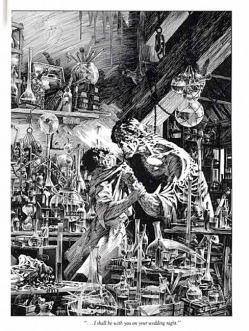
Frankenstein is encouraged to seek a greater understanding of the world around him. He grows up in a safe environment, surrounded by his loving family and friends. However before his departure off to Ingolstadt, Elizabeth became ill with scarlet fever and his mother who tried to care for her dies. Frankenstein becomes obsessed with studying theories of sciences that focus on achieving natural wonders. Whilst at the university, Frankenstein is exceptional in chemistry and other sciences and becomes interested in galvanization. He searches for the origin of life, in part through studying how life decays, and he discovers the secret to grant life to something that is lifeless. He begins to think in terms of creating an actual human being whom he could bring to life. In the process of his creation, Frankenstein had sought after human parts from graves and he collected bones. Frankenstein received many of his materials from the dissection room and slaughter-house. He continues to work, despite the fact that he is using corpses to complete his creation. He disregards everything else. Victor's creation is complete and he gives it life. When the creature awakes he feels disgust at the creature's appearance. He runs out of the room in disgust and flees to his own room. He now tries to avoid the creature. The creature comes to his bedside to speak to him. But Victor rushes out of the room on seeing him.
He awakes the next morning meets his dearest friend, Henry Clerval. Henry has been able to convince his father to let him study at Ingolstadt. Victor brings him home, but behaves strangely, and Henry notices that Victor is not well. After this, Henry tries his best to take care of Victor. As Victor regains his health, he re-establishes contact with Elizabeth and reads her letters. Elizabeth and the family have been extremely concerned about him for the past few months. She goes on to tell the tale of Justine Moritz, who was adopted by Caroline. Henry is at the university to study the oriental languages, and Victor joins him as well. The summer passes away and they head homewards. Clerval proposes a walking tour of Ingolstadt. Victor returns to his previous enjoyment of nature. Victor receives news of William's murder. The letter relates how William's body was found lying on the grass, and a miniature portrait of Caroline that William carried with him is now missing. Elizabeth blames herself for this because she gave him the locket. He decides to visit the spot where William was murdered and he sees the monster he has created. He suddenly realizes that the monster must certainly be William's murderer. He realizes that people around him would never believe his story. Victor Frankenstein receives news that the murderer is Justine Moritz. Victor is shocked and denies the charge. One of the servants has found the miniature of Caroline in the pocket of Justine's dress. Victor repeatedly claims her innocence. Victor and the family attend Justine's trial as witnesses. Other witnesses testify to Justine's good character. Elizabeth then goes on to defend Justine, but it is of no use. Justine is condemned to death. She finally confesses to the crime, and Elizabeth is horrified at this. Elizabeth and Victor go to visit Justine in prison. Justine pleads her innocence before Elizabeth, who had believed her guilt after her confession. Justine is hanged and dies a condemned murderer.
He awakes the next morning meets his dearest friend, Henry Clerval. Henry has been able to convince his father to let him study at Ingolstadt. Victor brings him home, but behaves strangely, and Henry notices that Victor is not well. After this, Henry tries his best to take care of Victor. As Victor regains his health, he re-establishes contact with Elizabeth and reads her letters. Elizabeth and the family have been extremely concerned about him for the past few months. She goes on to tell the tale of Justine Moritz, who was adopted by Caroline. Henry is at the university to study the oriental languages, and Victor joins him as well. The summer passes away and they head homewards. Clerval proposes a walking tour of Ingolstadt. Victor returns to his previous enjoyment of nature. Victor receives news of William's murder. The letter relates how William's body was found lying on the grass, and a miniature portrait of Caroline that William carried with him is now missing. Elizabeth blames herself for this because she gave him the locket. He decides to visit the spot where William was murdered and he sees the monster he has created. He suddenly realizes that the monster must certainly be William's murderer. He realizes that people around him would never believe his story. Victor Frankenstein receives news that the murderer is Justine Moritz. Victor is shocked and denies the charge. One of the servants has found the miniature of Caroline in the pocket of Justine's dress. Victor repeatedly claims her innocence. Victor and the family attend Justine's trial as witnesses. Other witnesses testify to Justine's good character. Elizabeth then goes on to defend Justine, but it is of no use. Justine is condemned to death. She finally confesses to the crime, and Elizabeth is horrified at this. Elizabeth and Victor go to visit Justine in prison. Justine pleads her innocence before Elizabeth, who had believed her guilt after her confession. Justine is hanged and dies a condemned murderer.
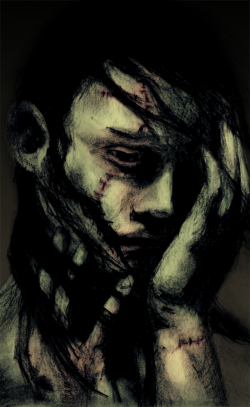
Distraught with grief and sadness for his lost ones because of the creation of the monster, Frankenstein seeks peace within the mountains. After some time in solitude, the Monster approaches Frankenstein. He is so blinded by his own fury and hatred that he fails to notice the pain and disdain on the monster's face. Victor accuses the monster, addressing him as the devil. But the monster is calm and merely asks Victor to recall the duty he has towards his creation. The Monster then begins to tell Frankenstein of his interactions with humans and how they fear and hate him, and in turn he is forced to hate them. The Monster talks about how he becomes educated by observing the De Lacey family. Feeling isolated and exiled from humanity, he seeks to befriend the family, but this is prevented by their fear of the Monster. Due to this fear, it causes the Monster to seek vengeance towards his creator. He asks Victor Frankenstein to create for him a female companion because humanity would not accept him therefore his is lonely. The monster assures Victor that he will leave him in peace if he agrees to comply with his conditions. He also warns him that if his wishes are not fulfilled, he will wreak havoc in the form of death on his creator's family. Victor rejects the idea at first but in fear he quickly accepts. The monster announces that he will return as soon as the creature is ready.
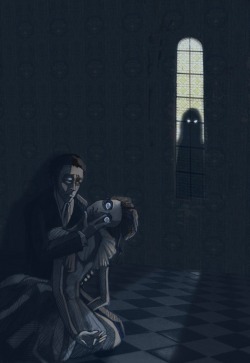
Victor now heads home at sunset and reaches a fountain where he cries bitterly. Although Victor is afraid of the monster, his conscience does not allow him to continue working on his new assignment. Therefore, he keeps delaying the work. Victor, in a fit of desperation, destroys the almost completed creation. He vows not to resume his labors and confronts the creature. The creature departs, threatening that he will appear again on Victor's wedding night. Victor wakes up in the morning to find himself totally lost. Hungry and fatigued, he arrives in a strange land. He is greeted rudely and told to appear before a magistrate. Since a dead body has been found under suspicious circumstances, he is suspected of committing the murder. Victor is told to identify the body, and he is shocked to find that it is Henry's. After this discovery Frankenstein is ill and becomes bed-ridden for two months. His health becomes renewed and he returns home with his father. Once he returns home, he marries Elizabeth, and they spend a happy time together, enjoying each other's company. It begins to rain that night and Victor's terror mounts. He goes to check the surroundings and is startled by screams from Elizabeth's room. He finds her dead in their bed with the monster's marks on her. Victor collapses into unconsciousness. He decides to see if his father and Ernest are still alive, and he goes home. His father cannot bear the grief of Elizabeth's death and dies soon after.
He vows to avenge their unnatural deaths. Just then, the monster whispers that he is satisfied that Victor has decided to remain alive. Victor endures all kinds of hardships to remain in pursuit of the monster. He pursues the monster northward and procures a sled and dogs to cross the snow. Then he sees the monster before him at barely a mile's distance. Unfortunately, he loses track of the monster once again, and now the sea itself separates him from his enemy. It is at this point that he encounters Robert Walton's vessel. Victor finally dies, requesting that they destroy the monster. Then, Robert is witness to the monster's repenting for his evil deeds. He hears something in Victor's cabin, and he discovers the monster standing over his creator's dead body. The monster confesses that he did feel pity for Victor. He decides that he will kill himself with fire. The monster is soon lost in the darkness.
He vows to avenge their unnatural deaths. Just then, the monster whispers that he is satisfied that Victor has decided to remain alive. Victor endures all kinds of hardships to remain in pursuit of the monster. He pursues the monster northward and procures a sled and dogs to cross the snow. Then he sees the monster before him at barely a mile's distance. Unfortunately, he loses track of the monster once again, and now the sea itself separates him from his enemy. It is at this point that he encounters Robert Walton's vessel. Victor finally dies, requesting that they destroy the monster. Then, Robert is witness to the monster's repenting for his evil deeds. He hears something in Victor's cabin, and he discovers the monster standing over his creator's dead body. The monster confesses that he did feel pity for Victor. He decides that he will kill himself with fire. The monster is soon lost in the darkness.
Theme Analysis
Alienation and Isolation
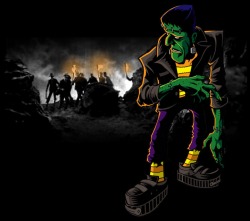
Mary Shelley emphasizes the theme of isolation within the novel, it plays a central theme, both affecting the story and the individual characters. You can already see this expressed through the settings describe, like Walton explore the North Pole, or how Victor isolates himself and disregards society. The theme is prominent when Frankenstein begins to create his creature. Frankenstein’s extreme devotion to his creation have such a devastating effect on his mind that he neglects all the valuable aspects of his labor that constitute a scientific endeavor. His negligence for himself and his experimental protocol make the process appear more like magic than science. Also this isolation and alienation is forced upon the Frankenstein monster which causes his hateful actions towards Frankenstein. As the monster is shooed away from society and suffers with loneliness, he blames Victor for leaving him, and therefore demonstrates his hatred towards mankind and victor by killing his beloved ones.
Justice versus Injustice
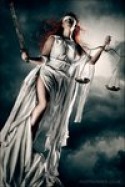
Both justice and injustice play a large role within the novel as well. Characters that take full blame for their responsibility are just and righteous. For example, Elizabeth pleads Justine's case in court after Justine is accused of William's murder. Victor knows the creature committed the crime, yet he does not reveal the creature's wrongdoing because he knows that that would jeopardize him. Victor goes throughout the majority of the novel not accepting his responsibilities of his actions until it is too late, when his wife, Elizabeth dies. Only until his loved ones dies, that is when he accepts responsibility for his actions and vows to avenge their deaths. With the Frankenstein monster, you can say that he seeks justice for what his creator has placed upon him, but as how humanity has treated him.
Hidden Knowledge
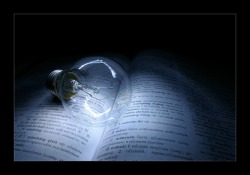
In the beginning of the novel Walton shares his ambitions and expectations of the results of the trip with Margaret. Walton is highly optimistic that success would unveil a divine power or knowledge. He then eagerly tells her of his determination to reach his goal. He desires to access what no one has yet found for the benefit of society and for his own reputation. Frankenstein desperation to find success pushes his physical and mental health to the limits. This demonstrates the consequential effects of yearning for what is philosophically forbidden to achieve. Frankenstein’s thirst for hidden knowledge and power are epitomized when he resolves on achieving what no man has done before. The mysterious nature of his aspiration foreshadows the horrific result of his labors. Frankenstein expresses his grief over his rash, naïve thirst for knowledge, comparing his downfall to that of Satan’s, just as the monster had. In creating a monster, he himself became one. The monster witnesses the power of language as a human form of communication. His surprise upon learning of this inspires him to seek an understanding of it. As he discovers more of the power of language, he learns about its written form, and his eagerness to master speech is rekindled as he determines to learn.
Friendship

In his second letter, Walton expresses his wish for a companion who could provide him aid on his journey. The sailors around him are either unlike him in “taste” or mentality. He then complains that, in addition to aiding him, a companion would provide him with comparing, and such a person could empathize with him. When Frankenstein finds shelter with Walton, Walton finds that the guest fulfills his only wishes. The grandeur of Frankenstein’s character is stressed by Walton’s desperate longing for a friend. Walton grows more attached to Frankenstein over time and begins to admire every aspect of his character. The theme of friendship is best demonstrated in Frankenstein’s selfless love towards Elizabeth, who Frankenstein’s family chooses to take care of. He sees it as a change to have someone who he can cherish and protect alone. Frankenstein also finds a friend by the name of Henry Clerval whom takes care and tends to Frankenstein when he is sickened and bed-ridden. The Frankenstein monster also seeks out acceptance and a companion to be with. He finds Victor upon a mountain and he asks him to make him a companion to eliminate the feeling of isolation and loneliness.
Man's Innate Goodness

The ambitious Frankenstein before Ingolstadt had been like those typical of boys in their childhoods. However, after having accomplished his desires, Frankenstein is plagued by horror. Despite succeeding, his success becomes a curse to him. Frankenstein realizes only after the death of William that he has committed and unfathomable crime. This naïve desire to animate lifeless matter ends up concocting a demon. Frankenstein had once acknowledged Justine’s meritable personality and not wished to harm her, but the destructive creature he creates and unleashed into the world ruins this seemingly perfect character. Frankenstein’s monster explains truthfully that he had been innately good, but his personality was corrupted by society’s scorn of his hideous and grotesque appearance. His misery is the result of mistreatment by what would normally be considered a “superior” species. Frankenstein’s monster upon studying the history of man discovers the contradictory nature of man. It appears to him as if all mankind is good, but that man is corrupted and becomes viciously violent in life. The monster muses over the mystical nature of knowledge, which to him grants charitable abilities but which introduced into the young, inexperienced mind the evils and horrors of society. His resent for such evils and horrors drives him to detest his own abilities. Frankenstein’s childhood ambitions are optimistic, but after his creation of the monster, his life takes a plummet and he realizes what he has done wrong.
Correlation to Science and Profit
Within the novel Frankenstein Victor searches for what is hidden, the unknown, for example, granting life to something that was once lifeless in hopes for fame and fortune. He becomes so obsessed in reaching his goal that he disregards everything around him, his friends and his family. Frankenstein is blinded by his desires and aspirations of reaching what no man has done and therefore he creates a monster that will lead to his downfall. His perspective becomes narrowed when he performs to achieve this task. He forgets everything and becomes unaware of the atrocious actions he is committing, such as digging graves and scavenging body parts for the construction of the monster. Due to his narrow scope of view, he does not take into account the consequence of his actions, and so because of this, his loved ones die. Victor tries to hunt and seek out something that was meant to be hidden, and because of this, it ends up being his downfall, or his hubris. The correlation between science and profit with the novel is that Frankenstein thirsts for the glory of doing what know man has done before. He does this by attempting to reanimate something lifeless, by giving life, or some can say, by playing God. Frankenstein dreams of glory, to be known for his scientific achievements, but his ambitions weaken him. He lacks the responsibility to take the blame for his actions and so he falls in the end.
